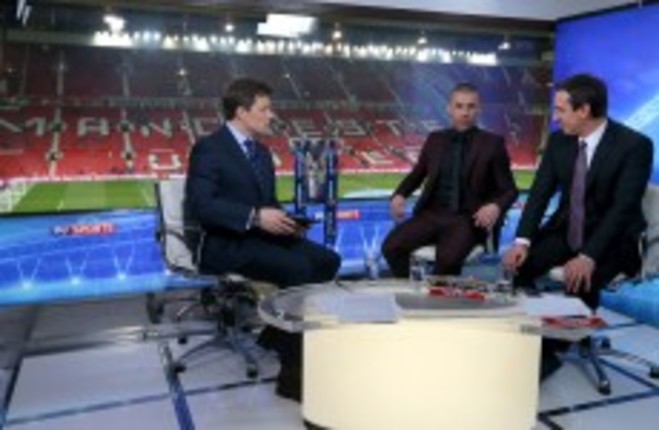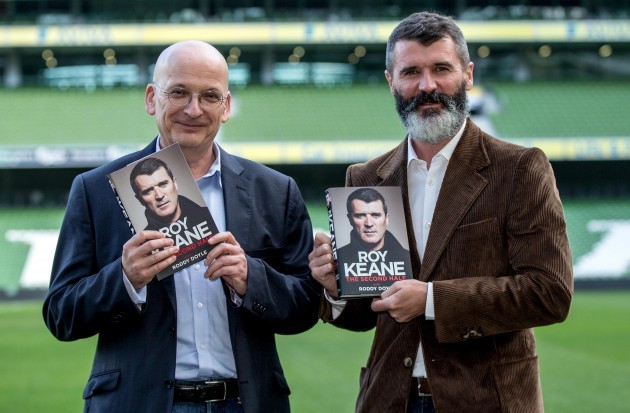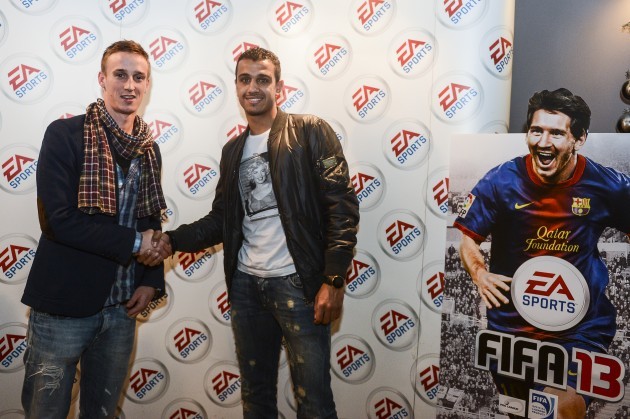TheScore.ie recently chatted to Jonathan Wilson, the author of many acclaimed sports books including ‘Inverting the Pyramid’ and Editor of The Blizzard, an innovative quarterly football publication that embraces long-form journalism and complex ideas about the game. The interview below focuses on a range of loosely interconnected topics including his reasons for setting up The Blizzard, the impact of the internet on journalism, the increasing prominence of tactical journalism and how Championship/Football Manager has influenced the way a new generation of fans and critics alike think about the game. Read on, and enjoy…
TheScore.ie: You have written about how in 2010, you set up The Blizzard owing partly to your frustrations with the restrictions of mainstream media outlets. Have they adapted since then and even been influenced to a degree by publications such as The Blizzard?
I think [mainstream journalism] has evolved. I’m not sure what the reason is. I’m not sure if they’re directly trying to compete with us. But newspapers have accepted and recognised that longer-form pieces do work online.
I think often, in cases like this, technology is the driving force. The design of websites now is much better, much cleaner than it was six years ago. And because of that, it makes it much easier to read longer pieces. It’s not the sort of process where you’re left holding your head after 1000 words. You can comfortably read online as you’d read a book.
There’s a paradox there. The smaller the device, the easier it is to read. It’s not just looking at your desktop or looking at your laptop. It’s something that’s portable. You can read it for 10 minutes and put it down. A lot of people had come to the same conclusions I had where there was a gulf that wasn’t being filled – something you can read for 10 minutes, put it down and go back to.
The Blizzard wasn’t alone. There were lots of different projects with similar names. Things like In Bed with Maradona and other websites doing long-form stuff. And things like The Guardian have recognised it. The Guardian particularly is very prepared to do long-form now and Grantland in the US, and even Bleacher Report. Bleacher Report, in particular, was seen as just being click-bait, but it’s become something much more respectable. And long-form started that.
I still think The Blizzard has a niche there because we do slightly more obscure topics. We need to tackle things in more detail. But I think there has been a general change in the medium.
TS: How original an idea was The Blizzard? Were you working off a template? Did you gain inspiration from anywhere in particular?
Not directly, but Perfect Pitch, a quarterly magazine, that I think only ran for four issues in the late 90s [had an effect]. It, for whatever reason, didn’t work. I don’t specifically know why it didn’t work, but I’d imagine, if it existed today, due to social media and the possibility of marketing things through Twitter [it would have worked]. I’m not saying that’s why it failed. I don’t know why it failed. But its problem was probably that it was ahead of its time. It was something we were aware of, but I’m not sure we took inspiration from it.
There was also publications like Offside in Sweden, they were all in different formats, but they were essentially trying to do what we’re trying to do, which is to look at things with analytic rigour and allow writers to write. Were they an inspiration? I don’t know. But obviously they’d feed into the general consciousness.
Of the people [who work on The Blizzard], two of us worked on the Sunderland fanzine in the early 90s. We saw how if you were motivated by a project as a result of liking it rather than [doing it] for financial reward, you could create a deep project from that. It was for Sunderland fans in the early 90s, so it was a different scale for what we were doing, but the general experience was not dissimilar. Certainly, it was our experience working on that, which gave us a knowledge of the process that allowed us to do it.
(The furore caused by the publication of Roy Keane’s most recent book provided a reminder of the continuing power of the written word)
TS: You seem to adopt a relatively positive tone in discussing the online evolution. Overall, has the Internet done more good than harm as far as its influence on football journalism is concerned?
Whether it’s a bad thing, I don’t know, the medium’s changed. It’s what happens with communication. Communication develops. If 0.1% of the population in Britain are interested, 0.1% of the population in the US, 0.1% of the population in Australia, that concept doesn’t really mean anything. If you start to amalgamate those, which you can do online, you can break the market, which makes it worth catering to. So in that sense, it’s been a positive, but there’s been a negative side to communication as well.
As well as the good stuff, there’s an awful lot of terrible blogs and trolling. But whatever makes humans communicate better and more widely, if you’re broadly positive about human nature, then it’s a very good thing, if you’re broadly negative about human nature, then it’s not a good thing.
I think even now, there’s still a credibility problem with the internet. There’s still a tendency to trust the thing that’s written down. It’s fascinating that Harry Redknapp and Alex Ferguson and Roy Keane were doing a lot of interviews about their books recently, yet what is it that gets people interested? It’s the book. It’s the printed word. You imagine they sat down and spent time on it — I’m sure Harry Redknapp spent less time than Roy Keane did. But that’s their sort of testament. The book still has a weight that day-to-day and online journalism doesn’t, particularly with Roy Keane and Kevin Pietersen.
So there is still a credibility to the written word that perhaps isn’t there online. I was very keen and persuaded the others [at The Blizzard] that other journalists would take us more seriously if we had a printed product. We’d all seen in the previous decade websites that had come up and then disappeared. Setting up a website can be quite cheap, whereas print says we have a little bit of backing, we’re prepared to design this properly. It says we’re confident we can get the 8,000 words at the right time in a format that we’re happy to say is frozen in time.
The flip side is that the internet allows journalists to check things really easily. Something I’ve found with the sports books going back to the 80s and 90s, there are huge numbers of little mistakes.
You can see why it happened. The writer thinks they know and can’t really be bothered to go to the library or go to a newspaper and check, whereas today, it’s a matter of 10 seconds to bang it into Google and check ‘okay’ he scored the goal, or whatever. From that point of view, a journalist’s day-to-day work is there to check, so it’s much easier [for them]. When some 17-year-old kid comes off the bench that you don’t know about, you just search Google and find out who he is, where he comes from, what his background is, which we can use to make better pieces.
TS: In recent times, tactical journalism, which you specialise in, has noticeably become more mainstream. Sky now even devotes a whole show to it in the form of Monday Night Football. Yet in comparison to the likes Italy and Spain, Britain and Ireland have seemed quite reluctant to look at the game in this way until recently. What do you think was the reason for their ostensible unwillingness to consider football in this sophisticated manner for so many years
I don’t know about Ireland, but if you look at what newspapers were in Britain versus what they are, it’s a completely unique scenario. Newspapers came along at the same time the train system was being rolled out and so, you could print a newspaper in London and it was in Glasgow in five hours. And so, there’s a national scope to newspapers and there’s 13 of them all competing with one another. That means you have some at the tabloid end of the market, some at the broadsheet end of the market and it’s really rigorous.
It’s given Britain a really oppressive thing that’s thrusting itself forward the whole time. You have to do the big investigative stuff because you have to get a march on your rivals. You have to be funnier and cleverer than your rivals because you want people to read your paper.
That level of competition just doesn’t exist anywhere else. And one of the results is that the papers are incredibly eclectic. You pick up The Guardian or The Times, and it’s got music, politics, foreign coverage, arts coverage, sports coverage, it’s got everything.
If you go to Italy or Spain, you’ve got sports papers covering sport and it’s not really touched on much in the more mainstream papers. You’ve also got a Madrid paper, a Barcelona paper, a Milan paper, a Turin paper… The result of that is if you get a sports paper, obviously they’ll go into more detail because they’ve got more pages to fill, as they’re not filling it up with news or politics. It’s just that the way our press grew up, it didn’t really lead to specialised coverage.
What’s happened recently with the proliferation of TV channels, you now know if the person is watching Sky Sports on a Monday night, they’re a proper football fan — someone who cares about football and knows a lot about football. Therefore, you can be more sophisticated, because you assume a base knowledge. It’s a specialised voice and that’s what the internet’s done — it’s helped that process.
The modern audience is very fractured. In England in the 80s, when we had four channels, I watched any sport that was on TV — swimming, equestrian, athletics — because I like sport. But there’s no way in the world I’d watch any of them now. I just watch football, cricket and golf, and nothing else. Because I can watch golf in the US, I can watch cricket from India or South Africa or wherever, I can watch football from England, Ireland, Scotland, Wales or anywhere, so that leads to great specialisation.
I think I mentioned before, this idea that you get these niches from each country, but you put them together and get a critical mass. And Sky Sports is trying to target that niche. Whereas, BBC or ITV in the 80s had to appeal to the woman doing her ironing on the Saturday night or the student watching the telly while doing his homework. With some action and fairly general punditry, everybody understands and can join in. [Pure sports channels] demand greater depth.
In terms of the other aspect of the question, football in Britain is a working class sport, whereas in central Europe, it’s a quite a middle-class sport. The way things have worked in Britain, the working classes don’t have the university education of the middle classes, with less training in [rigorous] analysis. The further you go in education, the more you can embellish that capacity to analyse. The people who play and watch football, because they were predominantly working class, that sort of way of approaching it was never really on the agenda.
What we’ve seen in the last 20 or 25 years is the increasing gentrification of football for good or ill, and that means there is a more sophisticated, better-educated audience who demand coverage to match their needs. That’s not to suggest people in the 70s or 80s didn’t understand what was going on in football, far from it. It was just having that capacity to articulate it demands a level of further education.
It may well be that an increasing level of people going to university has helped that as well. Certainly, there are far more people in university now than there was before. So more people in society have that level of education and more people warm to that approach.
(A generation of footballers, critics and fans have grown up under the influence of computer games such as Fifa and Championship Manager)
TS: Finally, you’ve referenced being an avid player of games like Championship Manager et al. These games were obviously hugely popular with people of a certain generation. How big an influence have they been in shaping the way a new generation of both critics and fans look at football, if at all?
Championship Manager, FIFA, Pro Evo and Sensible Soccer before it, they all demand a tactical intelligence. With Championship Manager in particular, that’s part of the game, you’ve got to do that.
I think Championship Manager and Football Manager have given us a vocabulary as well. If someone says ‘DMC,’ you know they mean ‘defensive midfielder central’. So just from providing the terms that people can use easily and understanding what those terms mean, that’s a very valuable tool. So playing Championship Manager isn’t essential to creating a tactical understanding of the game, but I certainly see how it would develop an understanding.
Jonathan Wilson, Philippe Auclair, Uli Hesse & host Damien O’Meara of RTE Sport will be speaking at an event in The Sugar Club on 18 November. More info here.



